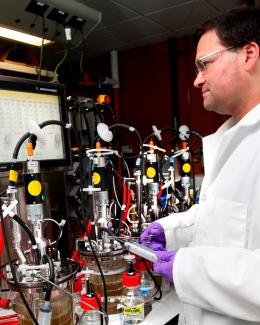Abstract
Background: Agave species can grow well in semi-arid marginal agricultural lands around the world. Selected Agave species are used largely for alcoholic beverage production in Mexico. There are expanding research efforts to use the plentiful residues (bagasse) for ethanol production as the beverage manufacturing process only uses the juice from the central core of mature plants. Here we investigate the potential of over a dozen Agave species, including three from cold semi-arid regions of the United States, to produce biofuels using the whole plant.
Results: Ethanol was readily produced by Saccharomyces cerevisiae from hydrolysate of ten whole Agaves with the use of a proper blend of biomass degrading enzymes that overcomes toxicity of most of the species tested. Unlike yeast fermentations, Clostridium beijerinckii produced butanol plus acetone from nine species tested. Butyric acid, a precursor of butanol, was also present due to incomplete conversion during the screening process. Since Agave contains high levels of free and poly-fructose which are readily destroyed by acidic pretreatment, a two step process was used developed to depolymerized poly-fructose while maintaining its fermentability. The hydrolysate from before and after dilute acid processing was used in C. beijerinckii acetone and butanol fermentations with selected Agave species.
Conclusions: Results have shown Agave’s potential to be a source of fermentable sugars beyond the existing beverage species to now include species previously unfermentable by yeast, including cold tolerant lines. This development may stimulate development of Agave as a dedicated feedstock for biofuels in semi-arid regions throughout the globe.



